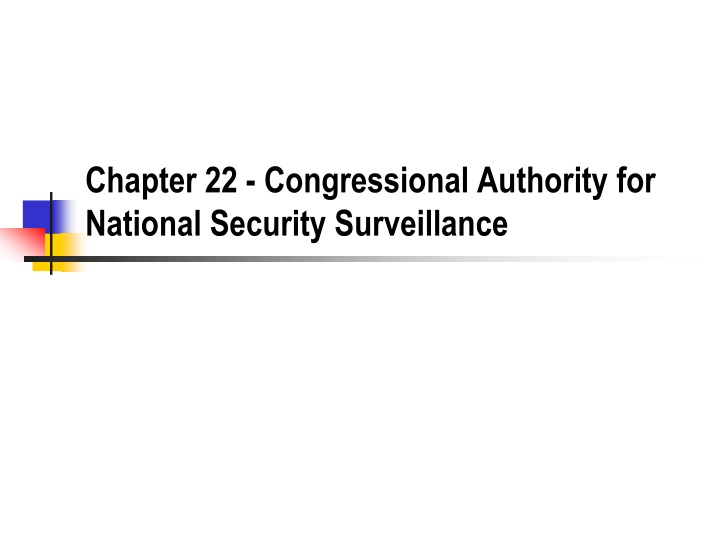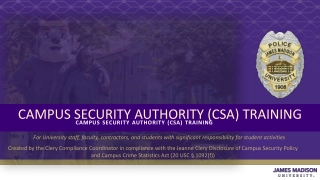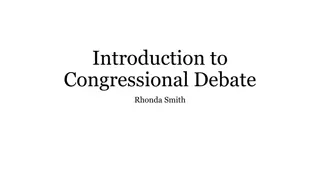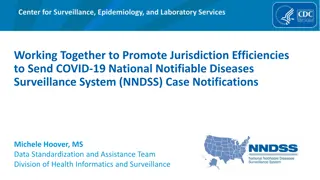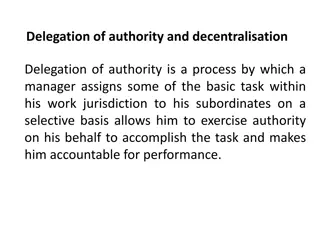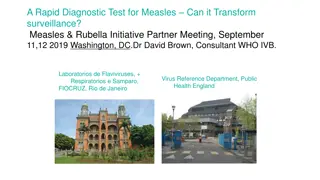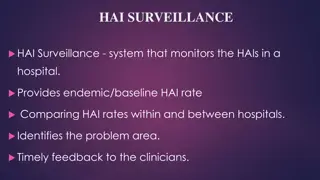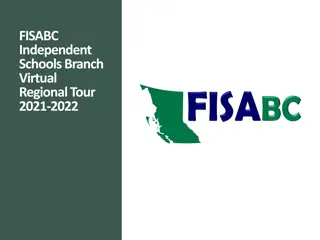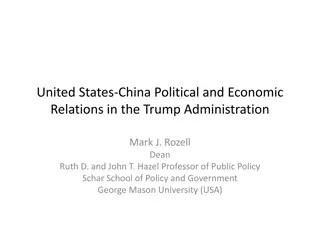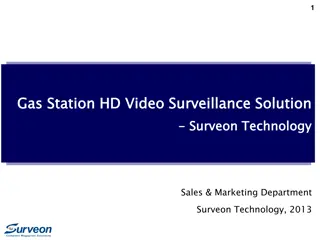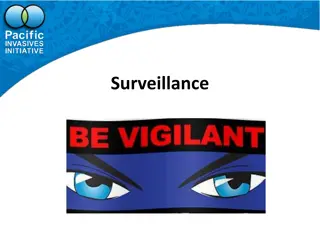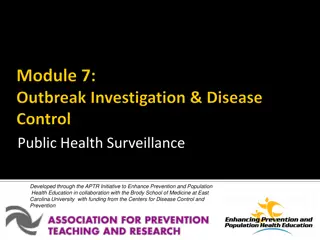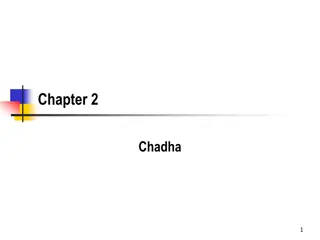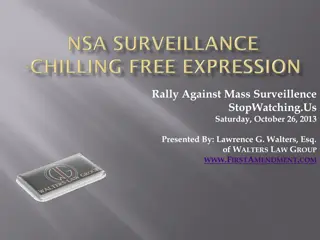Congressional Authority for National Security Surveillance under FISA
The Foreign Intelligence Surveillance Act (FISA) was passed in 1978 in response to abuses outlined in the Church Report. The Foreign Intelligence Surveillance Court (FISC) oversees FISA applications, with the ability for government appeal through the Foreign Intelligence Surveillance Court of Review (FISCR) and even the Supreme Court if necessary. The FISC consists of eleven judges, while the FISA appeals court hears government appeals from FISC decisions. FISA applications are filed with the FISC and must be approved by the Attorney General, with the requirement of probable cause to believe the target is a foreign power or agent.
Download Presentation

Please find below an Image/Link to download the presentation.
The content on the website is provided AS IS for your information and personal use only. It may not be sold, licensed, or shared on other websites without obtaining consent from the author.If you encounter any issues during the download, it is possible that the publisher has removed the file from their server.
You are allowed to download the files provided on this website for personal or commercial use, subject to the condition that they are used lawfully. All files are the property of their respective owners.
The content on the website is provided AS IS for your information and personal use only. It may not be sold, licensed, or shared on other websites without obtaining consent from the author.
E N D
Presentation Transcript
Chapter 22 - Congressional Authority for National Security Surveillance
When was FISA passed? 1978 What abuses in the Church Report drove the passage of FISA? See p. 6, Church report VII 2
United States v. Rosen, 447 F. Supp. 2d 538 (DC EDV 2006) We talked about Rosen in a previous chapter. All we are using it for here is the FISA information.
What is the FISC and who sits on it? The FISC consists of eleven district court judges selected by the Chief Justice from at least seven judicial circuits and serving staggered seven year terms. See 50 U.S.C. 1803(a). At least three of the FISC s judges must reside within twenty miles of Washington, D.C. For emergency proceedings. Probably less relevant with modern communications technology.
Is there an appeal from its decisions? In the unlikely event that a FISA application is denied by a judge of the FISC, the government may seek review of such denial in the Foreign Intelligence Surveillance Court of Review (FISCR), and if necessary, in the Supreme Court of the United States. See 50 U.S.C. 1803(b).
What is the FISA appeals court? Similarly, FISA provides for designation by the Chief Justice of three District or Court of Appeals judges to sit as a special Court of Review to hear appeals by the government from denial of an application by one of the FISC judges.
Procedure Who is the application for a FISA warrant filed with? FISC Who must approve the application? Attorney General Is there any need for the usual 4th Amendment reliable informant?
What must the judge find that there is probable cause to believe?? (1) the target of the electronic surveillance or physical search is a foreign power or an agent of a foreign power, except that no United States person may be considered a foreign power or an agent of a foreign power solely upon the basis of activities protected by the First Amendment to the Constitution of the United States; and (2) for electronic surveillance, each of the facilities or places at which the electronic surveillance is directed is being used, or is about to be used, by a foreign power or an agent of a foreign power; or (3) for physical searches, the premises or property to be searched is owned, used, possessed by, or is in transit to or from an agent of a foreign power or a foreign power.
What is the standard of review? This is a four corners review of the document. The court does not look beyond the content of the warrant. What is the judge really deciding? Does he trust the AG? Do you expect for many of these to be denied?
FISA warrants in ordinary criminal investigations Can evidence obtained with a FISA warrant be used in an ordinary criminal investigation? FISA explicitly allows the use of evidence derived from FISA surveillance and searches in criminal prosecutions. See 50 U.S.C. 1806(k) and 1825(k) How can this undermine the criminal law 4th amendment process? 10
FISA warrant procedure Is a FISA warrant served on the person being investigated? No When, if ever, will that person find about the warrant? If the information is used in a criminal prosecution. 11
Contesting the admission of information from a FISA warrant What if the AG thinks the release of the information necessary to review the adequacy of the warrant would endanger national security? And, if an aggrieved person moves to suppress FISA evidence or to obtain FISA material, then upon the filing of an affidavit by the Attorney General stating under oath that disclosure of such material would harm national security, the district court must review the FISA warrant applications and related materials in camera and ex parte to determine whether the surveillance or search of the aggrieved person was lawfully authorized and conducted. 50 U.S.C. 1806(f) and 1825(g).
How does the trial court review a contested warrant? The review of the basis for the warrant is de novo. Does the court defer to the agency? No Is there a presumption about the information provided in the application? But the government is correct that the certifications contained in the applications should be presumed valid.
Who gets to see the warrant? Do defendants have a right to see the documentation supporting a FISA warrant so that they can challenge it? (United States v. Squillicote, 221 F.3d 542 (4th Cir. 2000), cert. denied, 532 U.S. 971 (2001)) No why not? 14
What does the defendant have to show? What standard does the defendant have to overcome to prove that the information is unreliable if the warrant concerns a United States person? clearly erroneous When does FISA allow the disclosure of the information in the application? It allows a reviewing court to disclose such materials only where such disclosure is necessary to make an accurate determination of the legality of the surveillance.
What do the Rosen defendants claim shows that the application is clearly wrong and thus the judge should disclose it contents? Defendants claim this condition is met, by arguing (1) that the FISC s determination that they were agents of a foreign power was surely wrong; and (2) that evidence of the government s evident failure to comply with FISA s minimization procedures requires disclosure.
What is the FISA definition of an agent of a foreign power? (A) knowingly engages in clandestine intelligence gathering activities for or on behalf of a foreign power, which activities involve or may involve a violation of the criminal statutes of the United States; (B) pursuant to the direction of an intelligence service or network of a foreign power, knowingly engages in any other clandestine intelligence activities for or on behalf of such power, which activities involve or are about to involve a violation of the criminal statutes of the United States; . . . or (E) knowingly aids or abets any person in the conduct of activities described in [the subparagraphs above] or knowingly conspires
Which construction of clandestine intelligence gathering activities would apply to defendants? collection or transmission of information or material that is not generally available to the public.
What cannot be used as the sole reason to believe that a US person is an agent of a foreign government? Importantly, FISA is clear that in determining whether there is probable cause to believe that a potential target of FISA surveillance or a FISA search is an agent of a foreign power, the FISC judge may not consider a United States person an agent of a foreign power solely upon the basis of activities protected by the First Amendment. 50 U.S.C. 1805(a) (emphasis added). Does this mean that 1st Amendment activities cannot be used at all in supporting an application?
What is lawful 1st Amendment activities? What is the example of an unlawful 1st Amendment activity? foreign intelligence services [are] hid[ing] behind the cover of some person or organization in order to influence American political events and deceive Americans into believing that the opinions or influence are of domestic origin and initiative and such deception is willfully maintained in violation of the Foreign Agents Registration Act. Can an activity be a 1st Amendment activity if it is not lawful?
Can FISA be applied to pre-crime? As FISA sdrafters made clear: The term may involve not only requires less information regarding the crime involved, but also permits electronic surveillance at some point prior to the time when a crime sought to be prevented, as for example, the transfer of classified documents, actually occurs.
What is the purpose of minimization procedures for US persons? These minimization procedures are designed to protect, as far as reasonable, against the acquisition, retention, and dissemination of nonpublic information which is not foreign intelligence information.
Do minimization procedures prevent any sharing of information obtained with FISA? What are the exceptions? Crime and foreign intelligence information. What is really protected? Personal information not related to crime or foreign intelligence What should government do with information on a US person once the investigation is complete? Destroy it.
What is the purpose of minimization procedures? Are these procedures really just a reaction to the dirty tricks of the CHAOS and COINTELPRO period? If the government has a FISA warrant to listen to a suspect s phone calls, can it listen to both sides of the call? What if the third party caller is engaged in criminal or national security violations?
What is the FISA definition of international terrorism? (1) involve violent acts or acts dangerous to human life that . . . would be a criminal violation if committed within the jurisdiction of the United States or any State; (2) appear to be intended (A) to intimidate or coerce a civilian population; (B) to influence the policy of a government by intimidation or coercion; or (C) to affect the conduct of a government by assassination or kidnapping; and (3) occur totally outside the United States, or transcend national boundaries in terms of the means by which they are accomplished, the persons they appear intended to coerce or intimidate, or the locale in which their perpetrators operate or seek asylum. Id. 1801(c).
What is definition (4) of electronic surveillance? (4) the installation or use of an electronic, mechanical, or other surveillance device in the United States for monitoring to acquire information, other than from a wire or radio communication, under circumstances in which a person has a reasonable expectation of privacy and a warrant would be required for law enforcement purposes.
What could this cover? Hidden microphones? Bugs in cars? Access to the microphone and camera in a cell phone? Access to the microphone and camera in a desktop computer?
Do you need FISA for calls that are between international cities? Why didn t Congress require this? Would that be going beyond the Constitution?
How long is a physical search warrant good for? A physical search may be approved for the period necessary to achieve its purpose, or for ninety days, whichever is less. 50 U.S.C. 1824(d)(1).
What about against foreign powers? But a search may continue for up to one year if it is directed against a foreign power, or up to 120 days if the target is an agent of a foreign power. Id. 1824(d)(1)(A) and (B).
Do you need to serve a search warrant for FISA physical searches? Will the suspect even know there was a search?
What is a foreign power? (1) a foreign government or any component thereof, whether or not recognized by the United States; (2) a faction of a foreign nation or nations, not substantially composed of United States persons; (3) an entity that is openly acknowledged by a foreign government or governments to be directed and controlled by such foreign government or governments; (4) a group engaged in international terrorism or activities in preparation therefor; (5) a foreign-based political organization, not substantially composed of United States persons; or (6) an entity that is directed and controlled by a foreign government or governments. 33
What is a US person under FISA? Key the definition of US person differs between statutes. The FISA definition is narrower than some other statutes. (i) United States person means a citizen of the United States, an alien lawfully admitted for permanent residence (as defined in section 1101(a)(20) of title 8), an unincorporated association a substantial number of members of which are citizens of the United States or aliens lawfully admitted for permanent residence, or a corporation which is incorporated in the United States, but does not include a corporation or an association which is a foreign power, as define 34
Who is an agent of a foreign power? (1) any person other than a United States person, who (A) acts in the United States as an officer or employee of a foreign power, or as a member of a foreign power as defined in subsection (a)(4) of this section; A. The Foreign Intelligence Surveillance Act (FISA) 205 (B) acts for or on behalf of a foreign power which engages in clandestine intelligence activities in the United States contrary to the interests of the United States, when the circumstances of such person s presence in the United States indicate that such person may engage in such activities in the United States, or when such person knowingly aids or abets any person in the conduct of such activities or knowingly conspires with any person to engage in such activities; (C) engages in international terrorism or activities in preparation therefore [sic]; . . . 35
What is the provision that includes US persons? (2) any person who . . . (C) knowingly engages in sabotage or international terrorism, or activities that are in preparation therefor, for or on behalf of a foreign power; (D) knowingly enters the United States under a false or fraudulent identity for or on behalf of a foreign power or, while in the United States, knowingly assumes a false or fraudulent identity for or on behalf of a foreign power. 36
How does provision (c) cover the lone wolf ? (C) engages in international terrorism or activities in preparation therefore. Remember this is only for non-US persons. Has the FISC made the lone wolf provision unnecessary by using a broad definition of agent of a foreign government? Is there really a distinction between international terrorism and domestic terrorism? Is neo-Nazi activity international terrorism? 37
What is a roving wiretap? A roving wiretap permits investigators to listen in on any phone a target might use. If the judge finds that the actions of the target of the application may have the effect of thwarting the ability of the investigators to identify a specific communications carrier, Internet service provider, or other person needed to assist in the effective and secret execution of the surveillance, the order may authorize such assistance from multiple parties.
Does the phone have to be under the control of the target? Does the agency have to show that the target is using the phone? No Could you tap the phone of a third party when the target visits his house?
Emergency Surveillance How long is the emergency period for foreign powers, i.e., not US persons? Such surveillance is permitted for up to a year when directed solely at communications between or among foreign powers or focused on their property, when there is no substantial likelihood that a communication involving a U.S. person will be acquired. 50 U.S.C. 1802. What if it is a US person? the Attorney General may authorize the surveillance if a FISC judge is simultaneously informed and if an application is made to that judge as soon as practicable, but not more than 72 hours Do you think you can use info from the emergency surveillance in the FISA application?
How was this expanded by the Patriot Act? Within ten days after surveillance begins, investigators must provide the FISC with a description of the facility or place brought under surveillance, the reasons to believe that it is being used by the target, and any necessary minimization procedures. This provides 10 days before you have to have a FISA warrant.
Is this a free pass for short searches? What if you stop within 10 days? Is there any review at all? Is this like the 60 days under the War Powers Act?
How was the basis for probable cause under FISA expanded in 2000? past activities of the target, as well as facts and circumstances relating to current or future activities of the target. How does this broaden FISA? What does it mean for Jerry Adams? You stay a suspect
How was the pen register language modified after 9/11 to include email? dialing, routing, addressing, or signaling information transmitted by an instrument or facility from which a wire or electronic communication is transmitted, provided . . . that such information shall not include the contents of any communication. What else might this allow the feds to collect? How might an automatic out of office message get you in trouble under this law?
What does Duggan tell us about probable cause under FISA? We conclude that these requirements provide an appropriate balance between the individual s interest in privacy and the government s need to obtain foreign intelligence information, and that FISA does not violate the probable cause requirement of the Fourth Amendment. . . . United States v. Duggan, 743 F.2d 59 (2d Cir. 1984) 46
Are national security searches somehow not criminal searches? Does the Dugan court imply that national security investigations are not criminal, and thus do not need to meet the 4th amendment standards? The governmental concerns . . . make reasonable the adoption of prerequisites to surveillance that are less stringent than those precedent to the issuance of a warrant for a criminal investigation. 47
Who was Zacarias Moussaoui and why did he lead to the passage of the Patriot Act? The 20th hijacker. When FBI field agents in Minneapolis sought headquarters approval for a FISA search, they were turned down, apparently because there was insufficient indication that Moussaoui was an agent of a foreign power. The field agents then also failed to persuade headquarters to open a criminal investigation that would have employed grand jury subpoenas and law enforcement warrants to examine Moussaoui s computer and telephone records. Apparently, this request was denied because senior FBI officials worried that an open criminal investigation might thwart a later FISA application by defeating the primary purpose requirement. 49
Stopped here 50
